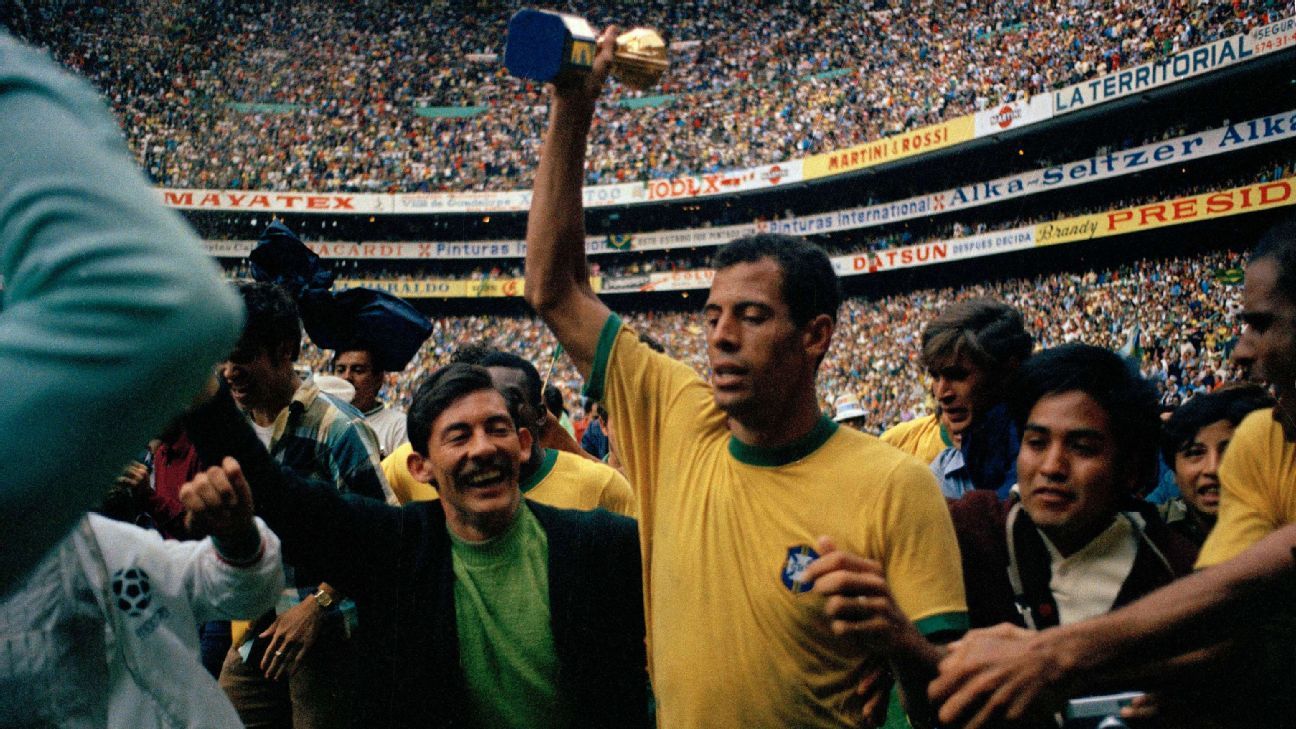Products You May Like
Precisely 50 years ago football experienced one of the most important days in its history.
On June 21, 1970, Brazil beat Italy 4-1 in Mexico City’s Aztec Stadium to win the ninth version of the World Cup with a performance of breathtaking skill. The first half was a relatively even game — the score at the break was 1-1 — but after the interval there was no holding Pele, Jairzinho, Gerson, Tostao, Rivelino, Clodoaldo, Carlos Alberto and Co. Brazil ran riot, and set a benchmark for footballing greatness which has served ever since.
Would this team be able to beat Brazil 1970? Were they as entertaining as Brazil 1970? These are questions used to assess the pretensions to greatness of any subsequent team.
– Stream ESPN FC Daily on ESPN+ (U.S. only)
– Gomez: How the 1970 World Cup changed the face of football
It is possible to make an argument that Brazil’s 1958 team was better. They defended with more solidity, not conceding a goal until the semifinal. And with Pele and Garrincha together, it is hard to find fault with the attack. They remain the only Brazilian — or South American — side to have won the tournament in Europe. But the boys of 1970 can count on a powerful advantage to press their claims: Television.
The 1970 World Cup was the first to be broadcast live to much of the planet, and the global audience got lucky. The tournament was a great success. There were none of the unsavoury incidents that had blighted the previous two — the infamous “Battle of Santiago” in 1962 and all of the controversy surrounding the sending off of Argentina’s Antonio Rattin, and the refereeing in general, of 1966. During the course of the action in Mexico, not a single player saw the new red card — the yellow and red cards were introduced for this tournament to ease communication. The memories were all positive. And the images, bleached out by the Mexican sunshine, had an ethereal quality that gave them an exotic beauty. It is hardly surprising that a link was frequently made between the achievement of the Brazil team and the moon landing a few months before. Both were jaw dropping displays of human potential with images that were unforgettable for a new, worldwide TV audience.
June 21, 1970, represents the end of a golden era of Brazilian football. With three World Cup wins in four tournaments, they established themselves as the game’s leading power not only for the titles, but also for the swaggering style of their play. This has never been entirely recaptured. They came again — with three consecutive finals, and two wins, between 1994 and 2002. But this period was always more pragmatic, less romantic than the Pele years.
Even more importantly, June 21, 1970, represents the birth of football as a TV experience.
The effect of this is often overlooked. It is a revolution in the game’s finances. Back in 1960, for example, Penarol of Uruguay could meet Real Madrid on more or less equal terms. Penarol could fill the Centenario stadium in Montevideo, Real could fill the Santiago Bernabeu. There was a parity of forces.
Fast forward to the modern era, and it hardly matters whether or not Penarol can fill their stadium. They cannot hope to match the resources of Real Madrid, who have seduced a worldwide audience of TV fans. With the introduction of television, the market stretches way beyond the number of fans willing and able to buy tickets. The potential audience is the entire planet, and those clubs who have captured a significant part of this audience are now operating on a financial level beyond the wildest dreams of a Penarol.
A handful of European clubs have been the biggest beneficiaries of this process. But it was international football — and specifically the World Cup — which saw it first and gave it the biggest push. FIFA’s revenue has always been dependent on the World Cup. The success of the 1970 tournament made it clear that ticket sales would not be the most important slice of the pie. What really mattered was the sale of TV rights.
This meant that FIFA were in the vanguard of changes introduced to improve the quality of the spectacle and seduce the “neutrals” — those without a connection with either of the two teams in action, but sufficiently interested to watch the game. For that 1970 World Cup, FIFA brought in the cards and worked hard to ensure that the referees did not lose control. Two decades later, after the 1990 World Cup had proved disappointingly defensive, it was FIFA who led the crackdown on the tackle from behind, working to ensure that the skillful players received more protection.
The triumph of football as a TV event would almost certainly have happened anyway. But it seems beyond doubt that Brazil’s performances in 1970 made sure that it happened quickly. The show put on by Pele and company was so good that watching the World Cup on TV became instantly habit forming.
That night, many would have gone to bed counting the days until the big kick off of West Germany 1974.
